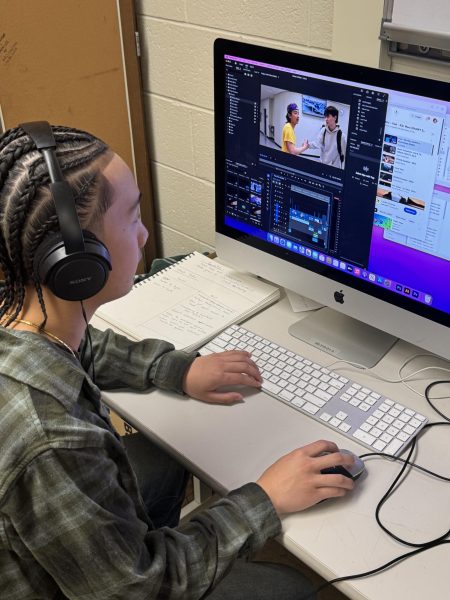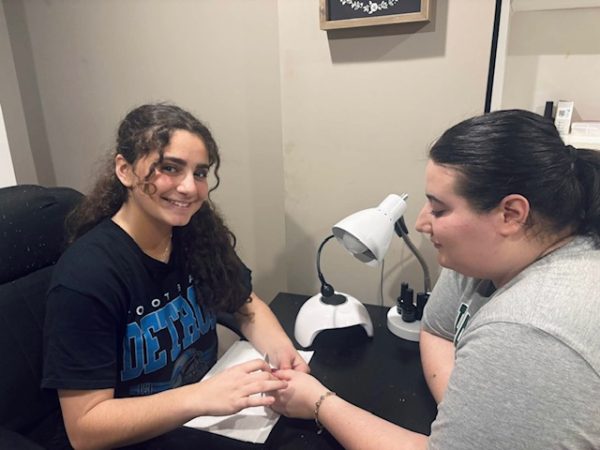Speak up against inappropriate power
If approached inappropriately by a person of power, steps should be taken to resolve the situation
*Olivia Arnold is an anonymous source. Her identity was kept private upon request.
One in nine girls and one in 53 boys under the age of 18 experience being approached by a person of power in an inappropriate manner, according to the Society for Adolescent Health and Medicine.
“I was working with another hostess at my job and she told me how she asked for her paycheck and he (our boss) put it down his pants told her ‘if you want it, come and get it.’ I was so disgusted; I felt like I had to run out of there and never come back,” junior Olivia Arnold* said.
It could be a boss, a teacher, a coach, a religious leader or another trusted adult. Regardless of the relationship, legally and ethically a person in power should not abuse their power and misuse anyone in a place where they should feel safe. In light of recent events at school, students question how to handle an inappropriate situation if it ever happens to them.
“You never ever want to internalize something. You don’t want to keep things inside because they can fester and grow,” principal Jared McEvoy. “You don’t want to be going through something where you’re not feeling good about a situation and now you’re not feeling good about yourself.”
While or after being approached, thoughts run through victims’ mind. How can I get help? What if getting help hurts me even more? Who can I go to? And what will people think of me?
No one should have to deal with being approached by a person of power and feeling constant worry because they might make another inappropriate move. In today’s society though, that isn’t always the case.
“I had to be around my manager the whole time I worked and it’s hard when I didn’t want to talk to him, but I had to if I wanted to be in the schedule more or had any issues. I hated bringing it up because I never knew what side I would I get,” Arnold said. “He would be so mean about things that I would cry at work.”
Arnold’s manager also made other employees uncomfortable, she said. Some workers engaged in sexual relationships with the manager, yet when he found out an employee didn’t like him in a sexual way, he acted rude in return and made working conditions challenging.
“I felt disgusted, like I just felt kind of like naive and I just felt like I could never see my boss again,” Arnold said. “Every time I saw him (her boss), I just felt this extreme rage and anger. I just wanted to yell at him a lot. It made me feel really panicked too.”
While some may speak up about being approached inappropriately by a person of power, some may not because they don’t realize the severity of the situation or they’re scared.
“We learn to trust those people (people in power)—whether it’s caregivers, parents, people out of school or people of authority. You’re taught because they’re adults you should trust them and they have your best interest in mind,” psychologist Lydia Popviski Brogren said.
Once trust is lost, the next step is to talk to a trusted adult, so steps can be taken to solve the issue.
“If you identify an issue, take immediate steps to remedy it; it might not be the easiest thing to do and very rarely is, but it’s quite often the best thing to do to try to fix the problem and bring some closure,” McEvoy said.
The effects following an occurrence of wrongdoing by a person in power can leave a victim confused about what they need to do and who they should and can trust for help.
“In the beginning, the person can feel like they’re actually cared for. It’s almost like a false sense of being cared for—or that the person actually loves them—even though they don’t,” Brogren said.
Victims can be trapped with feelings of shame and guilt from the perpetrator, so they don’t talk. Seeking out help could make a victim feel as if they’re losing a fight, like handling it the right way and reporting these incidents won’t solve the situation. However, they should always talk to someone because it is against the law and it affects one’s ability to work in a stress free environment, according to school resource officer and Shelby Township police officer James Knobelsdorf.
In the event a victim tells a friend about inappropriate actions from a person in power, the friend can provide assistance in several ways: talk to the friend and let them know it’s not their fault, they didn’t do anything wrong; and also: encourage them to talk to an adult they feel safe with. A friend can accompany a victim as support and help them talk with whomever they trust.
“If they don’t want to talk, I would highly recommend—even though it’s a friend and you don’t want to go against your friend and make them mad at you—you tell your parents or somebody who’s an adult whom you trust,” Brogren said.
If this situation occurs at school, a person should talk to a higher authority figure, such as: a counselor or the superintendent, according to McEvoy. By talking to a higher power, they can help decide if the police should get involved, which result in filing a complaint with the Michigan Civil Liberties Union to resolve the issue, according to Knobelsdorf.
“If something is making you uncomfortable and it’s to a point where you feel it’s not right, you need to tell somebody,” McEvoy said. “Don’t internalize it, don’t take it on yourself, seek out some help.”
Letting the person know the behavior is unwanted is an important step because if they still continue the behavior it’s a violation of the law, according to Knobelsdorf. If the behavior shocks the conscience, like the person of power talking about genitalia, it should be reported immediately, he said.
“If it was of a physical nature, then it’s an assault. Unwanted touching is an assault. The unwanted touchings and assault verbally is like somebody asking them or telling you ‘you look really nice.’ I’m being vague as far as saying look very nice, but they might cause sexual overtones. It wouldn’t give rise to a criminal complaint, but it would probably violate the Elliot Larson statute in Michigan, which mirrors the federal discriminatory and harassment laws,” Knobelsdorf said.
Shocking the conscience takes place when it makes a person think about how the situation was inappropriate between the person of power and the subordinate.
“If having a pornographic magazine out on the desk and it’s open with pornography in the workplace, that would be considered what shocks the conscience, so you don’t need to say that that’s inappropriate,” Knobelsdorf said. “Anybody looking at it would say that doesn’t belong in the workplace.”
By recording the inappropriate action with a phone, it proves it happened, instead of the person of power denying it later. Nowadays, it is simple to record an interaction or conversation with phone technology. Once the law is informed of the recording, it is used as evidence to further support the case.
“You can have your phone network setup, even if it’s in your pocket and hit record because you want that evidence in case they’re going to deny it later,” Knobelsdorf said. “So what would a neutral detached third party, like a jury or a judge who doesn’t have any interest in either party or a bias by either party, reviewing it [the recording] or listening to it think that it was inappropriate.”
A victim can always report what happens, but after it might be up to the law to decide if it is eligible to take further legal action. The severity of the inappropriate action determines if the case is eligible or not.
“[Victims should] utilize the school counseling. If that’s not enough, a lot of health insurances will cover and have therapy as a benefit,” Brogen said. “I think therapy is a huge benefit to all of this because it can be a life-long complex trauma that can impact their future relationships, whether it’s intimate or not. It can still affect them in so many different ways. It can lead to depression, anxiety and PTSD.”
Although facing inappropriate use of power from a person in power can potentially be a long and tiring journey, it is important to address the issue and put a stop to it for one’s self and possibly even others in the future.
“My best advice is don’t ever find yourself in a position where you don’t feel like you have somebody to go to, you do,” McEvoy said. “You just have to take that leap of faith and make that initial contact and just trust that there are people here to help you and support you. It’s just taking that first step that’s scary sometimes to get some help when you need it.”
Your donation will support the student journalists of Eisenhower High School. Your contribution will allow us to purchase equipment and cover our annual website hosting costs.









